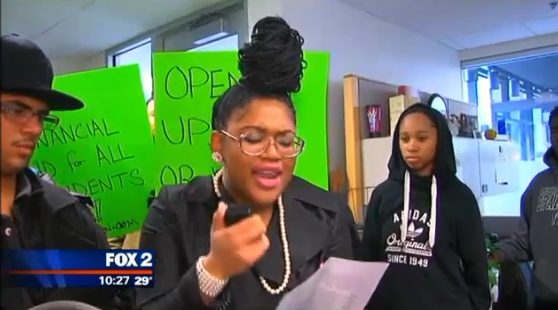Supreme Court Case Winner Challenges Rejected Michigan Applicant to Affirmative Action Debate

Brooke Kimbrough always dreamed of becoming a University of Michigan Wolverine. Her score on the ACT--a college readiness evaluation test--dwarfs the scores of most of her classmates. Earlier this month, she was part of a winning team at the National Urban League Debate Championship in Washington, D.C. Last week, she became a powerful symbol for exactly how Michigan's race-blind college admissions policies have failed.
Related: Student Stages Protest Against Rejection from University of Michigan
Over the course of this year I had the honor of working with University Preparatory Academy debate coach Sharon Hopkins, who guided Kimbrough and her partner, Rayvon Dean, to victory. Shortly after her team won the debate championship, I spoke with Kimbrough about her protest of U-M’s admission policy.
"This isn't about me," Kimbrough told me. "That's not why I'm doing this. The real problem is when students are denied and don't speak up, don't question the system that failed them." To that end, Kimbrough has joined with the Coalition to Defend Affirmative Action, Integration, and Immigrant Rights and Fight for Equality By Any Means Necessary (BAMN) to advocate for the rights of black students in admissions and on campus.
Nearly fifteen years ago, Jennifer Gratz, a white high school senior, was denied admission to the University of Michigan. Rather than keeping quiet, she also fought. Gratz began by mounting a coordinated legal and media battle to challenge her rejection. In 2003, the Supreme Court ruled in her favor, and its decision in Gratz v. Bollinger ended the university's system of preferential admission based on race. Encouraged by this victory, Gratz and other opponents of affirmative action went on to champion a statewide ballot initiative that completely banned any use of race as a criteria for admissions at Michigan's public universities.
At U-M, the years following the high court’s decision have seen a precipitous drop in the number of African-American students. For Kimbrough, who uses discussions of racial privilege and cultural politics in her debate competitions, her rejection from Michigan became an opportunity to highlight a concrete instance of colorblind discrimination.
While both Gratz and Kimbrough fought their decisions, Jennifer Gratz bristles at comparisons. "I fought for all applicants to be treated equally--as individuals, without regard to race," Gratz said in a comment on the Detroit News website. “This woman is standing up for group rights and asking for preferential treatment based on race while others are discriminated against, she wants unequal treatment. Ms. Kimbrough is fighting because she wasn't accepted; I fought because of discrimination in the admissions process, a major difference."
What critics of affirmative action like Gratz don't talk about, and what they are deeply invested in keeping hidden, is the racial violence and culture of white aggression that intensifies and pervades campus life for students of color when affirmative action policies are taken away. This dirty secret was blown apart earlier this year when University of Michigan's Black Student Union decided that they'd had enough, launching the viral Twitter campaign known as #BBUM (Being Black at U-M). Stories ranged from hurtful micro-aggressions to racial slurs to threats of physical violence. Overall #BBUM highlighted the dysphoria of a campus population of color whose number is in steep decline.
But so incensed is Gratz, 37, that she has challenged Kimbrough, 17, to a public debate on the issue of affirmative action, according to the Detroit Free Press. In an apparent attempt to appear gracious, Gratz, citing her potential opponent's youth and inexperience, offered to allow Kimbrough to include a BAMN representative on her side of the debate.
Continue reading here

No comments: